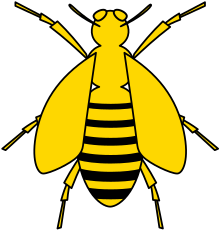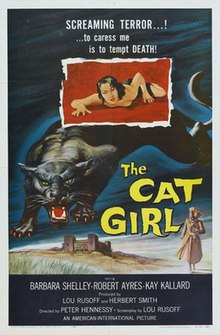벌(헤럴드)
Bee (heraldry)
나폴레온 3세의 제국주의 표준
고대 이집트에서 벌은 특히 하 이집트와 관련된 왕권의 휘장이었는데, 그곳에는 심지어 유년기에 벌왕이 있었을지도 모른다.[1]
불멸과 부활을 의미하는 꿀벌은 나폴레옹에 의해 부활된 메로빙족의 왕실 상징물이었다.[2]
꿀벌 공동체는 종종 정치 이론가들에 의해 인간 사회의 모델로 고용되어 왔다.이 은유는 아리스토텔레스와[3] 플라톤,[4] 버질과[5] 세네카,[6] 에라스무스와[7] 셰익스피어[8], 베르나르 만데빌의 <벌의 우화>에서, 혹은 베스 일병은 공공의 이익을 얻었고, 이 은유는 경제학자 프리드리히 하이에크와 존 메이너드 케인즈에게도 영향을 주었다.[9]톨스토이는 유사하게 인간사회를 전쟁과 평화의 벌 공동체에 비유한다.[10]장바티스트 시몬은 그의 작품 제목을 "Le gouvernment"라고 칭송했다. "La république des abilles (파리, 1740년)"
참조
- ^ 라이스, 마이클 이집트의 제작: 고대 이집트의 기원 기원전 5000-2000년, 2003년 2차 개정, 페이지 104.
- ^ 독수리와 벌은 팔의 나폴레옹 외투
- ^ Aristotle; Jowett, Benjamin (trans.). "Politics". MIT. pp. Book One, Part II. Retrieved 7 January 2017.
Now, that man is more of a political animal than bees or any other gregarious animals is evident.
- ^ Plato. Meno.
Socrates: How fortunate I am, Meno! When I ask you for one virtue, you present me with a swarm of them, which are in your keeping.
- ^ 버질, 조지아, 4권
- ^ Seneca. "Moral Letters to Lucilius". pp. Letter 84. On gathering ideas. Retrieved 7 January 2017.
We should follow, men say, the example of the bees, who flit about and cull the flowers that are suitable for producing honey, and then arrange and assort in their cells all that they have brought in
- ^ Erasmus (1974). Collected Works of Erasmus. University of Toronto Press. p. 260. ISBN 978-0-8020-5395-4.
- ^ Shakespeare, William. Henry V. pp. Act 1, Scene 2, lines 210–213.
Obedience; for so work the honeybees, Creatures that by a rule in nature teach The act of order to a peopled kingdom. They have a king and officers of sorts,
- ^ Skousen, Mark (2015). The Big Three in Economics: Adam Smith, Karl Marx, and John Maynard Keynes: Adam Smith, Karl Marx, and John Maynard Keynes. Taylor & Francis. p. 46. ISBN 978-1-317-45820-3.
- ^ Tolstoy, Leo. War and Peace. pp. Chapter 20.
MOSCOW meanwhile was empty. There was still people in the city; a fiftieth part of all the former inhabitants still remained in it, but it was empty. It was deserted as a dying, queenless hive is deserted.



